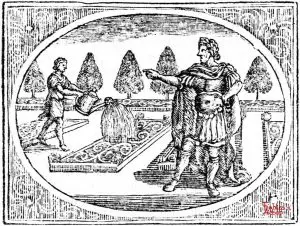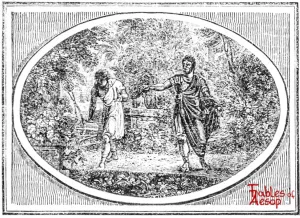A Slave performed minor tasks for Caesar hoping for his freedom. Caesar turned him down saying he must pay more than a token for freedom.
You need to pay a fair price for what you want.

JBR Collection
During a visit that Tiberius Caesar paid to one of his country residences, he observed that whenever he walked in the grounds, a certain Slave was always a little way ahead of him, busily watering the paths. Turn which way he would, go where he might, there was the fellow still fussing about with his watering-pot. He felt sure that he was making himself thus needlessly officious in the hope of thereby gaining his liberty. In making a Slave free, a part of the ceremony consisted in giving Him a gentle stroke on one side of the face. Hence, when the man came running up in eager expectation, at the call of the Emperor, the latter said to him, “I have for a long time observed you meddling where you had nothing to do, and while you might have been better employed elsewhere. You are mistaken if you think I can afford a box on the ear at so low a price as you bid for it.”

Samuel Croxall
AS Tiberius Caesar was upon a progress to Naples once, he put in at a house he had upon the mountain Misenus; which was built there by Lucullus, and commanded a near view of the Tuscan Sea, having a distant prospect even of that of Sicily. Here, as he was walking in the gardens and wildernesses, of a most delightful verdure, one of his domestic Slaves, which belonged to that house, putting himself into a most alert posture and dress, appeared in one of the walks where the Emperor happened to be, sprinkling the ground with a watering-pot, in order to lay the dust; and this he did so officiously, that he was taken notice of, and even laughed at; for he ran through private allies and turnings, from one walk to another; so that, wherever the Emperor went, he still found this fellow mighty busy with his watering-pot. But at last, his design being discovered, which was, that he fancied Caesar would be so touched with this diligence of his, as to make him free; (part of which ceremony consisted in giving the Slave a gentle stroke on one side of his face) his imperial Majesty, being disposed to be merry, called him to him; and when the man came up, full of joyful expectations of his liberty, Hark you, friend, says he, I have observed that you have been very busy a great while; but it was impertinently busy, in officiously meddling where you had nothing to do, while you might have employed your time better elsewhere; and therefore I must be so free as to tell you, that you have mistaken your man; I cannot afford a box of the ear at so low a price as you bid for it.
THE APPLICATION
Phaedrus tells us, upon his word, that this is a true story; and that he wrote it for the sake of a set of industrious idle gentlemen at Rome, who were harassed and fatigued with a daily succession of care and trouble, because they had nothing to do; always in a hurry, but without business; busy, but to no purpose; labouring under a voluntary necessity; and taking abundance of pains to show they were good for nothing. But what great town or city is so entirely free from this sect, as to render the moral of this fable useless any where? for it points to all those officious good-natured people, who are eternally running up and down to serve their friends, without doing them any good; who bv a complaisance wrong-judged, or ill-applied, displease, while they endeavour to oblige, and are never doing less to the purpose, than when they are most employed. How many are there who think themselves entitled to good posts from government, only for having been dabblers in politics all their lives, to the neglect and prejudice of their proper callings; for never failing to enquire the news of the day of their acquaintance, and expressing a hearty satisfaction or a deep concern, as the account given has affected them! There is another sort, who are so concerned lest you should find out that they are mere cyphers in life, that they over-act their part, and are ever in a hurry; who appear at coffee-houses, and other public places, looking about eagerly for one with whom they have no business, and wanting to be asked to stay, that they may hare an opportunity of telling you they cannot possibly do it. People of this cast always subscribe their letters with a Yours, in great haste, though they write to you only because they have nothing else to do. In a word, this fable is designed for the reformation of all those who endeavour to raise to themselves merit and applause from a misapplied industry. It is not our being busy and officious that will procare us the esteem of men of sense; but the intending and contriving our actions to some noble useful purpose, and for the general good of mankind.

Thomas Bewick (Caesar and The Slave)
As Tiberius Caesar was upon a journey to Naples, he stopped at a house which he had upon the mountain Misenus. As he was walking in the gardens attached to the house, one of his domestic slaves appeared in the walks, sprinkling the ground with a watering pot, in order to lay the dust, and this he did so officiously, and ran with so much alertness from one walk to another, that wherever the Emperor went, he still found this fellow mighty busy with his watering pot. But at last his design being discovered, which was to attract the notice of Caesar by his extraordinary diligence, in the hope that he would make him free,—part of the ceremony of doing which consisted in giving the Slave a gentle stroke on one side of his face,—his imperial Majesty being disposed to be merry, called the Man to him, and when he came up, full of the joyful expectation of his liberty, Hark you friend, says he, I have observed that you have been very busy a great while; but you were officiously meddling where you had nothing to do, while you might have employed your time better elsewhere; and therefore I must tell you, that I cannot afford a box on the ear at so low a price as you bid for it.
APPLICATION.
Phaedrus tells us upon his word, that this is a true story, and that he wrote it for the sake of a set of industrious idle gentlemen at Rome, who were harassed and fatigued with a daily succession of care and trouble, because they had nothing to do. Always in a hurry, but without business; busy, but to no purpose; labouring under a voluntary necessity, and taking abundance of pains to shew they were good for nothing. But what great town or city is so entirely free of this sect, as to render the moral of this Fable useless any where? For it points at all those officious good-natured people, who are eternally running up and down to serve their friends, without doing them any good; who, by a complaisance wrong judged or ill applied, displease, whilst they endeavour to oblige, and are never doing less to the purpose than when they are most employed. In a word, this Fable is designed for the reformation of all those who endeavour to gain for themselves benefits and applause, from a misapplied industry. It is not our being busy and officious that will procure us the esteem of men of sense; but the application of our actions to some noble useful purpose, and for the general good of mankind.
Perry #489

